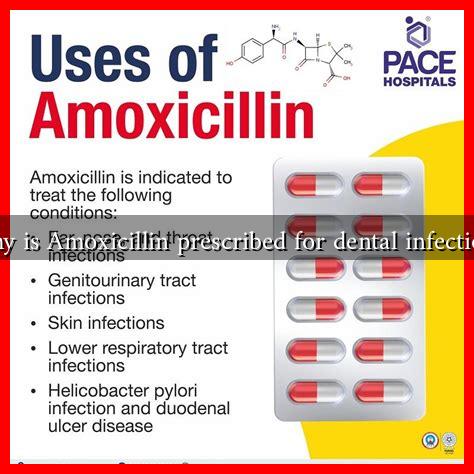-
Table of Contents
Why is Amoxicillin Prescribed for Dental Infections?
Dental infections can be painful and debilitating, often requiring immediate medical attention. Among the various treatment options available, Amoxicillin is frequently prescribed by dentists and healthcare providers. This article explores the reasons behind the prescription of Amoxicillin for dental infections, its effectiveness, and considerations for its use.
Understanding Dental Infections
Dental infections typically arise from bacteria that invade the tooth or surrounding tissues. Common types of dental infections include:
- Dental Abscess: A localized collection of pus caused by bacterial infection.
- Periodontal Disease: Infections of the gums that can lead to tooth loss.
- Endodontic Infections: Infections that occur within the tooth pulp.
These infections can lead to severe pain, swelling, and even systemic complications if left untreated. Therefore, timely intervention is crucial.
What is Amoxicillin?
Amoxicillin is a broad-spectrum antibiotic that belongs to the penicillin group. It is effective against a wide range of bacteria, making it a popular choice for treating various infections, including those in dental settings. The drug works by inhibiting bacterial cell wall synthesis, ultimately leading to the death of the bacteria.
Why is Amoxicillin Effective for Dental Infections?
There are several reasons why Amoxicillin is often the go-to antibiotic for dental infections:
- Broad-Spectrum Activity: Amoxicillin is effective against both gram-positive and some gram-negative bacteria, which are commonly involved in dental infections.
- Good Tissue Penetration: The antibiotic can effectively penetrate dental tissues, ensuring that it reaches the site of infection.
- Low Resistance Rates: Compared to other antibiotics, resistance rates for Amoxicillin remain relatively low, making it a reliable choice.
- Oral Administration: Amoxicillin can be taken orally, making it convenient for patients.
Case Studies and Statistics
Research supports the efficacy of Amoxicillin in treating dental infections. A study published in the Journal of Clinical Dentistry found that patients treated with Amoxicillin for dental abscesses showed significant improvement in symptoms within 48 hours. Another study indicated that 80% of patients with acute periapical abscesses responded positively to Amoxicillin therapy.
Furthermore, the American Dental Association (ADA) recommends Amoxicillin as a first-line treatment for dental infections, particularly in cases where the infection is severe or systemic symptoms are present.
Considerations and Side Effects
While Amoxicillin is generally safe, it is essential to consider potential side effects and contraindications:
- Allergic Reactions: Some individuals may experience allergic reactions, ranging from mild rashes to severe anaphylaxis.
- Gastrointestinal Issues: Common side effects include nausea, vomiting, and diarrhea.
- Drug Interactions: Amoxicillin may interact with other medications, so it is crucial to inform your healthcare provider of all medications you are taking.
Patients with a history of penicillin allergies should avoid Amoxicillin and discuss alternative antibiotics with their dentist.
Conclusion
Amoxicillin is a widely prescribed antibiotic for dental infections due to its broad-spectrum activity, good tissue penetration, and low resistance rates. Its effectiveness is supported by numerous studies and guidelines from reputable dental organizations. However, it is essential for patients to be aware of potential side effects and to communicate openly with their healthcare providers about their medical history. By understanding the role of Amoxicillin in treating dental infections, patients can make informed decisions about their oral health.


